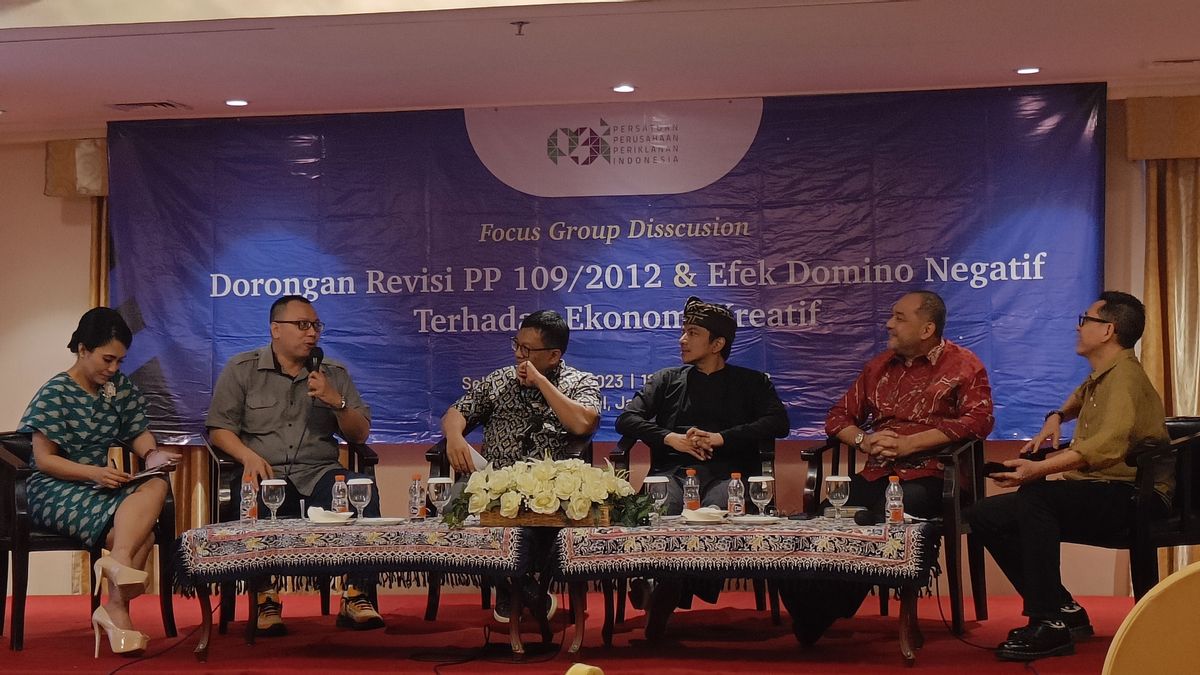JAKARTA - The rejection of the discourse on the revision of Government Regulation (PP) No. 109 of 2012 is still being carried out today, including advertisers and associations of street vendors. The plan to revise PP 109/2012 is known to threaten the income of advertisers and street vendors.
The Indonesian Advertising Association (P3I), which represents Indonesian creative economy industry players, including advertising, publishing, broadcasting, and other industry players, requests that the plan to revise Government Regulation Number 109 of 2012 (PP 109/2012) concerning the Protection of Substances Containing Addictive Substances The form of Tobacco Products for Health as stated in Presidential Decree (Kepres) Number 25 of 2022 is being reviewed.
This is because there is a push for a total ban on cigarette advertisements which is detrimental to business actors, who so far have also benefited from contributions from national cigarette advertisements.
P3I Chairperson Janoe Arijanto assessed that PP 109/2012 as the current regulation is comprehensive and still relevant to regulate various advertising and promotional activities for cigarette products.
Therefore, players in the advertising and creative industry sector asked the government to review the proposed revision plan.
"The creative economy industry sector, especially the advertising industry is experiencing rapid development. If a total ban on advertising, as stated in the substance of the revision of PP 109/2012 is carried out, it could later hit the creative and advertising industry sector hard," Janoe said. Focus Group Discussion themed Encouragement of PP 109 the Year 2012 Revision and Negative Domino Effects on the Creative Economy in Jakarta, Tuesday, March 21.
"What we understand is that every legal product has the right to communicate with target consumers. This should also apply to cigarette products whose communication is guaranteed and regulated by law," he added.
Various prohibitions on producer-consumer communication are also seen as efforts that contradict the government's vision of encouraging a conducive business climate.
This is because the advertising sector is an activity needed to help maintain business continuity and investment.
Janoe also said that the national creative economy industry sector also supports the government's efforts to reduce the prevalence of smoking among children under the age of 18 through various educational and socialization efforts in accordance with applicable ethical provisions and regulations.
"These efforts show good results, which according to data from the Central Statistics Agency (BPS) there has been a decrease in the number of child smokers in the last five years," he explained.
On the same occasion, Member of the Indonesian Advertising Council (DPI) Hery Margono said, in addition to complying with the applicable PP 109/2012, creative economy industry players in practice always comply with the provisions regarding cigarette advertisements regulated in the Indonesian Advertising Ethics which have considered various aspects, such as social, cultural, economic, and political prevailing in Indonesia.
"EPI is one of the guidelines used by advertising industry players, creative industries, and advertising companies. It is hoped that this can complement government programs in increasing public awareness of the dangers of smoking," explained Hery.
VOIR éGALEMENT:
Therefore, Hery emphasized, the plan to completely ban cigarette advertisements has the potential to cause huge losses to a number of sub-sectors of the creative economy industry, starting from advertising spending (media/publishing, advertising, TV and radio), advertising production (design, film/video), to the sponsorship of music events.
Moreover, he continued, based on Nielsen data, cigarette advertising is included in the top ten contributors to media advertising spending in Indonesia with an ad spending value of IDR 4.5 trillion in the first half of 2022 and IDR 9.1 trillion in 2021.
"If the plan for a total ban is carried out, the advertising industry and the national media will suffer huge losses due to loss of revenue from cigarette advertisements," he said.
"Apart from that, there will also be losses to indirect costs, mainly related to the production of advertising and promotional materials which will be reflected in the reduced workforce and reduced production of all related sub-sectors," he concluded.
The English, Chinese, Japanese, Arabic, and French versions are automatically generated by the AI. So there may still be inaccuracies in translating, please always see Indonesian as our main language. (system supported by DigitalSiber.id)











